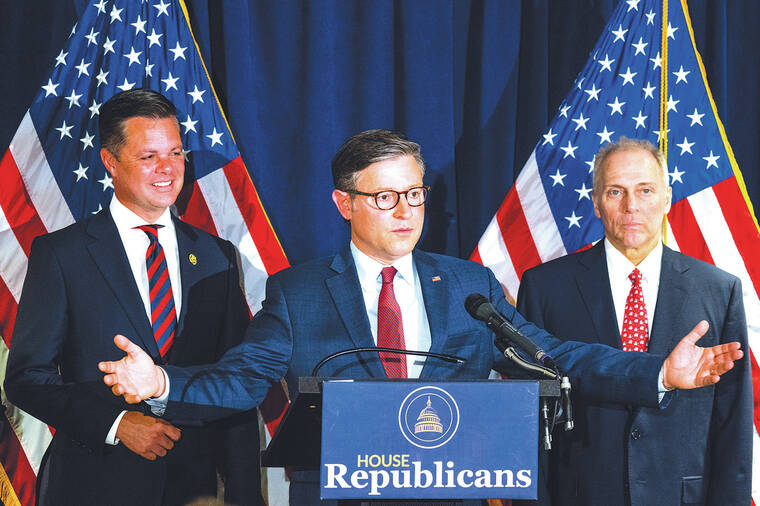Congress unveils short-term spending deal
WASHINGTON — Congressional leaders from both parties unveiled a short-term agreement to fund the government on Sunday, after Speaker Mike Johnson abandoned demands for a longer-term deal that also included new proof-of-citizenship requirements for voter registration.
The deal, which extends federal appropriations through Dec. 20, includes an additional $231 million to help the beleaguered Secret Service protect candidates during the upcoming presidential election and into next year. According to the Treasury Department, the United States has spent about $6.3 trillion in fiscal 2024, which ends Sept. 30.
ADVERTISING
The timeline of the deal allows Congress to sidestep a government shutdown during the campaign season, but it all but ensures that spending disputes will dominate the lame-duck period between the election and the inauguration of a new Congress in January.
“While I am pleased bipartisan negotiations quickly led to a government funding agreement free of cuts and poison pills, this same agreement could have been done two weeks ago,” Senate Majority Leader Chuck Schumer, D-N.Y., said in a statement heralding the temporary spending patch — known as a continuing resolution — and blaming Republicans for dragging their heels. “Instead, Speaker Johnson chose to follow the MAGA way and wasted precious time.”
In a letter Sunday to his colleagues explaining why he was forced to take the deal, Johnson wrote, “A continuing resolution is the only option that remains.” He promised to put it to a floor vote this week.
Johnson had made it a personal crusade to include in the spending package legislation requiring people to prove their U.S. citizenship when registering to vote, arguing it was necessary to prevent fraud, despite scant evidence of noncitizens voting. That requirement, known as the SAVE Act, was also supported by the hard right and by former President Donald Trump, who called on Congress not to pass a spending plan without “every ounce” of the proposal.
Johnson’s push, part of a proposal to extend funding through March, faced stiff headwinds in the Senate. Democrats rejected the voter registration policy, and members of both parties objected to the proposed timeline, arguing that the next president should not take office amid a bitter funding fight.
A bipartisan majority of the House voted last week to reject Johnson’s initial plan, and in the days since, the speaker has dropped his demands. He defended the move as necessary to let Congress wrap up business in Washington before the final weeks of a campaign in which control of the House and Senate are hotly contested.
“While this is not the solution any of us prefer, it is the most prudent path forward under the present circumstances,” Johnson wrote in his letter. “As history has taught and current polling affirms, shutting the government down less than 40 days from a fateful election would be an act of political malpractice.”
The bill largely is an extension of current funding levels. But Democrats and Republicans agreed to make one notable change, giving the Secret Service additional money to meet the considerable demands on its resources through the election.
The funds reflect the urgency that has taken root on Capitol Hill after two assassination attempts on Trump since July. Democrats and Republicans agreed to the extra funds despite criticism from members of both parties of broader organizational problems at the agency that led to the security lapses.
Notably, the bill makes the agency’s extra funding contingent on meeting congressional oversight demands, including the requests of a new bipartisan task force established to examine the first assassination attempt on Trump.
“There’s no doubt they need additional resources, but additional funding and resources is not going to solve the problem between now and Election Day,” Rep. Jason Crow of Colorado, the top Democrat on the task force, said Sunday during an appearance on ABC’s “This Week.”
“We can’t mass-produce Secret Service agents,” Crow added, noting that some agents were working 80 to 90 hours per week to cover the demands for protection, and recommending that the Pentagon send military officials to the agency to ease demands on its personnel.
Defense Secretary Lloyd Austin approved a request last month to provide military support to the Secret Service, though the Pentagon did not specify the nature of those resources.
Republicans have also called on Secretary Alejandro Mayorkas of the Department of Homeland Security, which oversees the agency, to shift resources to alleviate some of the strain. The agency is currently responsible for protecting the sitting president, a vice president who is also a presidential candidate and a former president who is the Republican nominee. That is in addition to its duties to provide security for former presidents and various dignitaries, including the foreign heads of state expected to attend the U.N. General Assembly in New York this week.
The pressures of that remit have prompted some Republicans to endorse speeding funds to the agency.
“If we need to buy the Secret Service some drones, I hold up my credit card and buy drones, technology, whatever they need to get us through this election over the next few months,” Rep. Michael Waltz, R-Fla., a member of the task force, said on “Fox News Sunday.”
This article originally appeared in The New York Times.
© 2024 The New York Times Company





